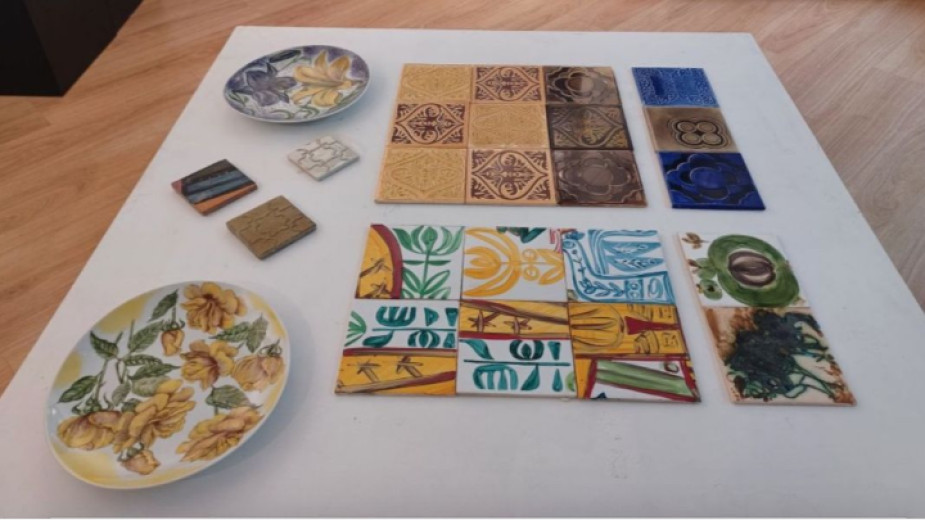 13
13
"Tableware", "assembly line", "production process" - this is the terminology of the so-called applied artists of 20th century Bulgaria. But one artist, trapped within the confines of a socialist factory, broke free and gave wings to her talent.
Marena Dzhingova spent eighteen of her active years as an artist and designer in the silicate industry at the Izida porcelain factory in Elin Pelin. "After her daily work, she would go to her studio and start experimenting," says Rumena Kalcheva, curator of the exhibition "Memory - Directions - Generations" at the Sofia Press Gallery and Bookshop in the capital. Dedicated to her art, the former student of sculptor Prof Velichko Minekov at the Academy of Arts became one of the most remarkable ceramists of her time.

"Marena Dzhingova was a beloved colleague. She worked nine to five in this demanding job and often helped out at the various stages of production," says Rumena Kalcheva. "Her team produced a variety of ceramic tableware, things we all saw in our parents' homes and grew up with. It is crucial to recognise that the artisans played a fundamental educational role in making this art a part of everyday life for all of us. And even if we talk about mass production, the aesthetic impact remains".
The exhibition featuring works by Marena Dzhingova presents a composite image of the artist during the socialist era — a woman who was everything in one: a mother, a working woman, and a creator, branded by prejudices against her gender, and putting in twice the effort to gain recognition for her talent. One of the prejudices that marked her time at the Academy was the belief that it was impossible for her to sculpt monumental works, as monumental art was thought to belong exclusively to the male sex.

"Even though she shifted her artistic focus in a new direction, we can easily see the sculptural foundation in her ceramic panels and works," says the curator of the exhibition, which will be open until April 30. "Sculpting is something she continued to carry with her, even though she abandoned it under the pressure of prejudices that remain somewhat prevalent today (we can see this when we try to count how many female sculptors there are)."

In her studio, Marena Dzhingova enters a world where she finds the motivation and strength to grow as an artist.
"What makes her an artist whose work has earned its place in art history is her unique approach to working with materials," emphasises Rumena Kalcheva. "She doesn't limit herself to classic techniques such as glazing, porcelain, clay, firing, and chamotte, but also incorporates additional elements into her works. For example, she melts metal threads and glass to create a more distinctive texture that adds depth and intrigue. That's why she's known as an 'experimenter'."

In the exhibition, where matter and spirit intertwine, mother and daughter meet on another level, communicating in a more sublime language.
"I have always respected my mother's art, but I have followed my own path," says Zlatka Andreeva, who graduated from the Academy of Arts with a degree in textile and fashion. "I called the exhibition Memory – Directions – Generations because we are different generations, and as artists, we have always been dedicated to our profession. Marena Dzhingova was a very serious person, highly critical of her own art — perhaps that's why she never decided to have a proper solo exhibition. Now, I am trying to showcase some of her works and her experiments."

Last year, 2024, marked the 85th anniversary of Marena Dzhingova's birth and eight years since she passed away. The exhibition is a unique way of commemorating the anniversary and reminding us of the power of women artists who have earned their place in the history of Bulgarian art. "She loved nature, and perhaps that is why her works exude such power and tenderness at the same time," says her daughter, who sees a part of her mother in each of her ceramic panels.
Photos by Diana Tsankova
Posted in English by Elizabeth RadkovaAt the end of May, British opera singer Jessica Leschnikoff was in Bulgaria to participate in the presentation of the first biographical book dedicated to her grandfather - Bulgarian singer and artist Asparuh Leschnikoff -Ari...
From July 4 to 12, the town of Karlovy Vary (Czech Republic) will host the 59th edition of the Karlovy Vary International Film Festival. The main competition section- the Crystal Globe Competition- features 12 films, 9 of them world premieres...
One of the titles that will be part of the National Theatre's repertoire in 2026 is already known. This is " The Physics of Sorrow ", directed by Slovenian director Jernej Lorenci. This is not his first collaboration with Bulgarian actors — his..
Following its outstanding success in Bulgaria, the film Gundi: A Legend of Love continues its journey abroad. On Sunday 20 July, it will be shown for the..

+359 2 9336 661
